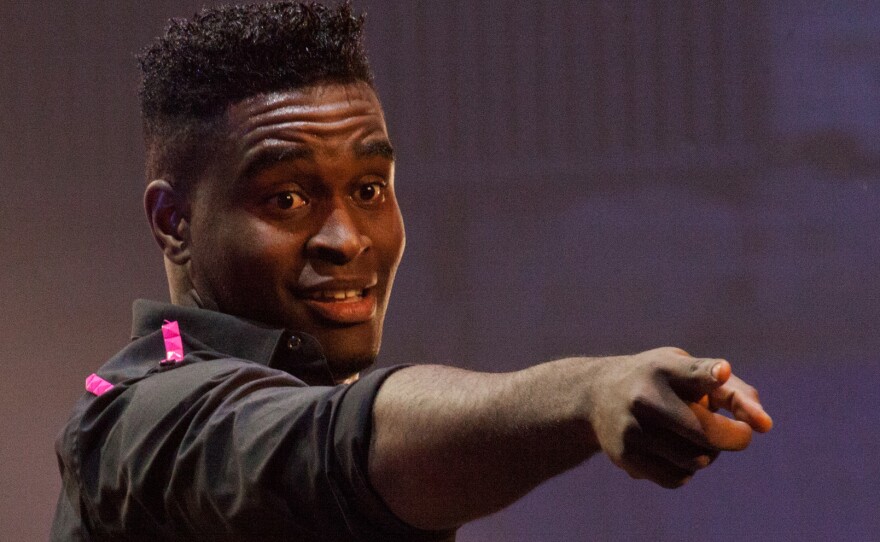
Keo Motsepe has made Dancing With The Stars history in many ways.
In 2014, he became the first black dancing professional on the show (they're the ones who teach the "stars" how to cha-cha-cha) and the first from South Africa.
This past Monday he broke what he calls "boundaries" in the ABC show's first same-sex dance, partnering with contestant Nyle DiMarco, an actor and model who is deaf. (Two women also paired up.) The idea came from DWTS judge and choreographer Bruno Tonioli. Motsepe thought it was "awesome" to take a chance and do something different.
And what was it like? "It's pretty much what you think it's going to be like — two guys who are strong dancing with each other." He was impressed with DiMarco's ability to adjust to changes in tempo via taps and other signals.
Motsepe experienced some Internet bullying this season, with trolls saying he wasn't a good enough choreographer for his partner, Jodie Sweetin, a star of the classic sitcom Full House. Then this Monday night, Motsepe and Sweetin did a dynamic jive dance that earned three perfect 10s from the judges.
Nonetheless, viewers voted the pair off the show. Motsepe was philosophical: "I'm very happy. I worked hard with Jodie. She's very special — that woman's heart and soul is like gold. I just wanted what's best for her. We left on a high note." Maybe his attitude stems from advice his dad used to give him as a kid: "Respect everyone you see and meet. It's not for them. It's for you."
We thought it was a good time to have a conversation with the 26-year-old terpsichorean to hear about his DWTS experience — and what drew him to dance in the first place.
I've read you started dancing at age 5.
My best friend and I used to play soccer, and he said I should try something different. I went to try dancing and just fell in love with it. I was like, "This is fun."
How did your parents react?
It made my mom happy. She was like, "Oh my God, I don't have to do laundry every day" [which was part of the soccer routine].
Was it unusual for a black kid to take ballroom dancing lessons?
Every dance school I went to was racially mixed, like 50/50.
When did you decide to make a career of dancing?
By the age of 7. I remember saying to my mom, 'Mom, this is gonna be my life. And she just looked at me like, "Mmmm-hmmmm, OK, yeah, he'll soon find out when he's 15, 16, what life is all about."
But you were right! You went on to win competitions and represent South Africa in world events. Did you keep up with school?
My mom pushed me to balance my school and dancing. She said, "I won't say stop dancing but balance everything in your life." That's what I did.
What did you learn from dancing?
I was disciplined with school and soccer, but [my mom] said as soon as I started dancing, my discipline of how I treat myself and how I treat other people was even more special.
Why?
I think it's because when you're dancing ballroom or Latin, you're not dancing by yourself. You always have a partner. You're in tune as one. You always make sure you give 100 percent, she gives 100 percent. You always make sure you are the frame and she [the partner] is the picture — that the woman looks good when the man takes care of her.
But aren't men and women equals?
It's one of the things in my culture, the woman comes first. You always make sure they're always happy, at all angles.
People in the U.S. often think of Africa as one big country. Have you run across that attitude?
It's funny you ask this question. On TV the other day they said they were showing "Africa" but they showed "Ghana," and they were showing the army and stuff like that, shootings and stuff. And people go, "That's how Africa looks."
What kinds of questions do you get about Africa?
You get questions like, do you guys have a beach like Santa Monica? Yep, we call it Capetown. The more I explain about my country, the more I keep myself true to my country.
In one interview you've said you are a prince. Is that true?
What do you think?
I believe half of what I read and none of what I hear!
I am a prince, yes sir, from my dad's side. My grandpa was a prince of a province back in South Africa. My dad declined the position and gave it to my uncle, his younger brother. But because I'm my dad's only son, I became a prince.
What does a prince have to do?
There's a responsibility to look after the area they're from, they talk to the community and the community talks to my uncle about fixing the street here, the buildings there.
Does your name have any princely meaning?
My name means "I rely on God" in Setswana (a Bantu language spoken in South Africa and other countries. "And I'm reliable so people rely on me."
Copyright 2016 NPR. To see more, visit http://www.npr.org/.






